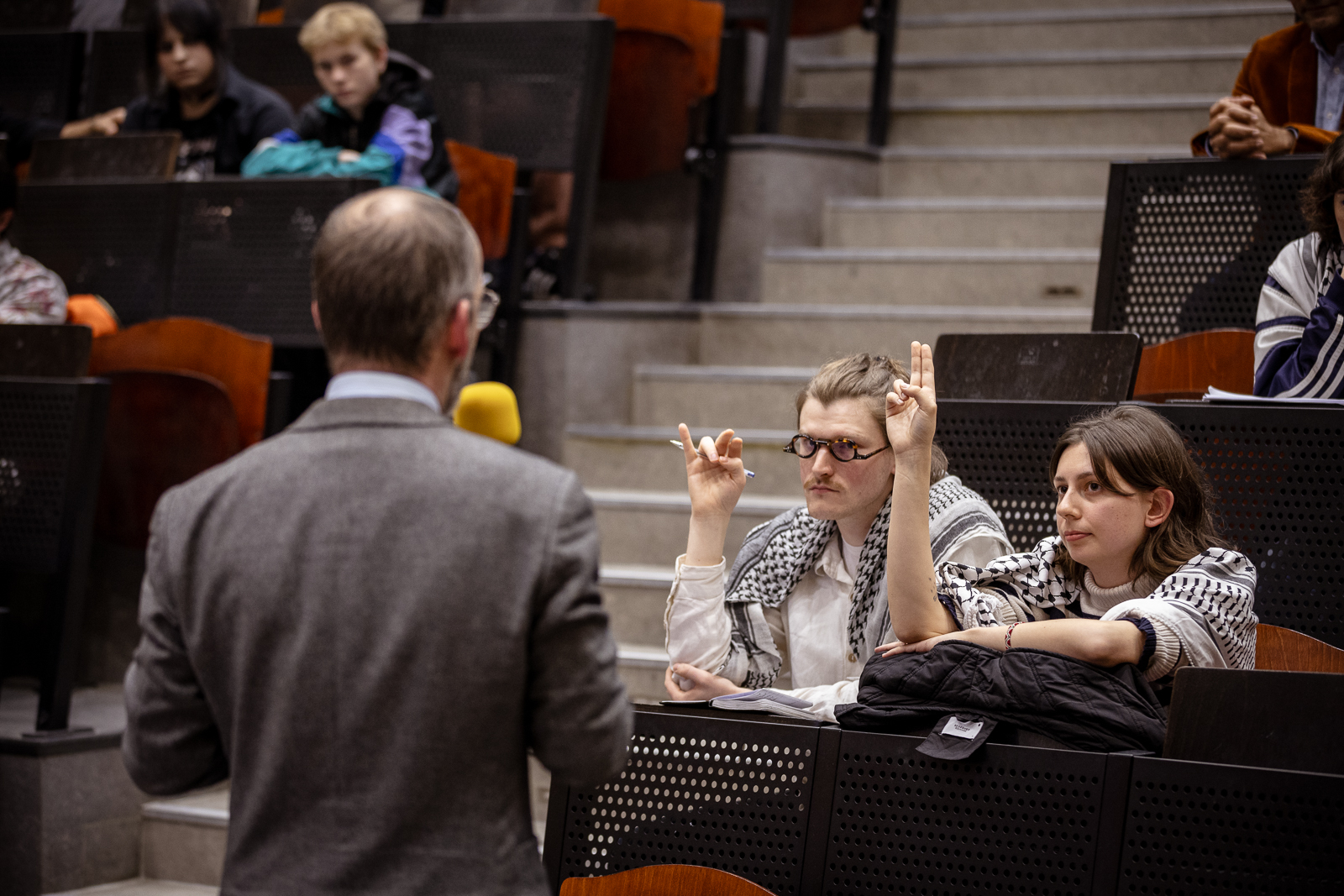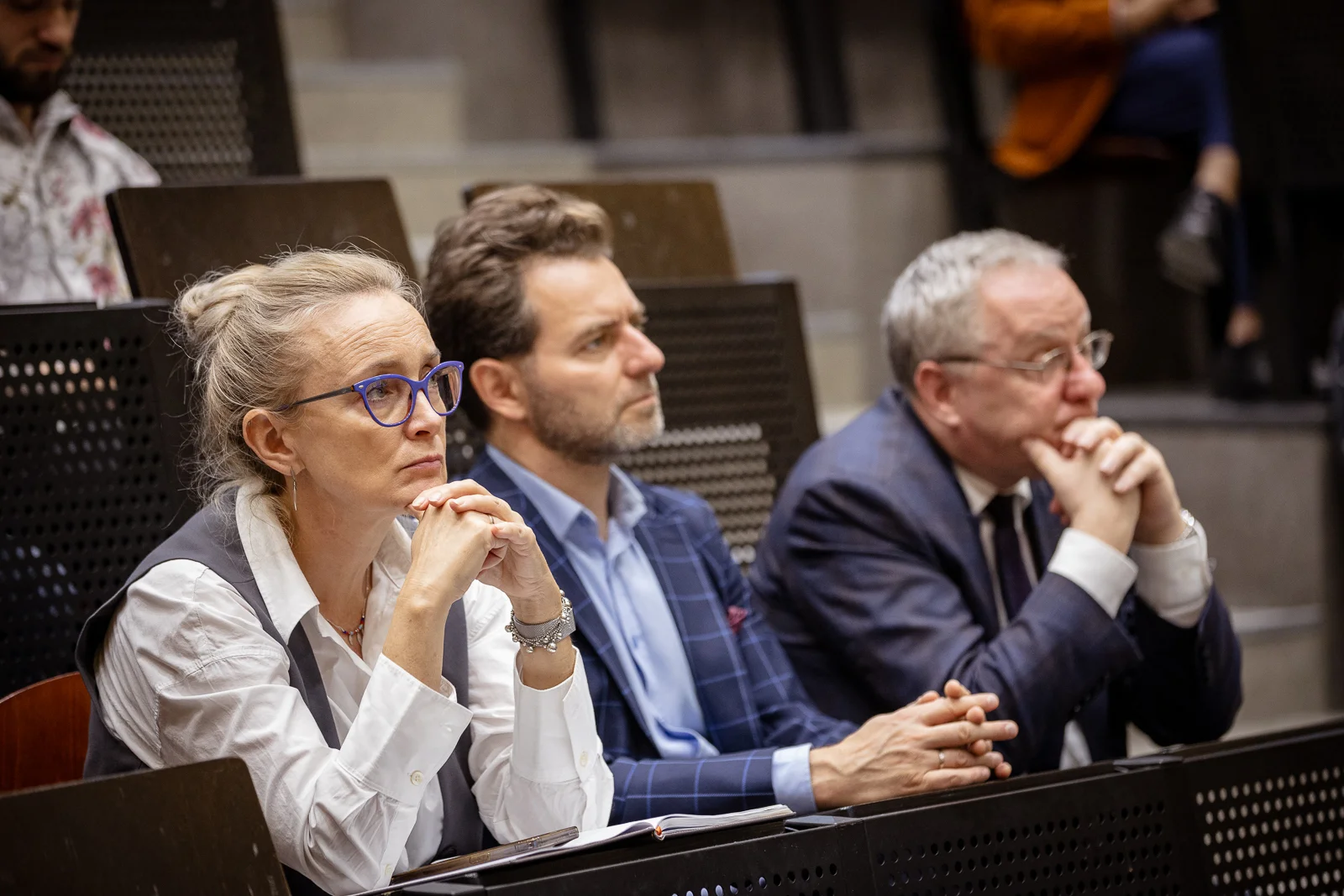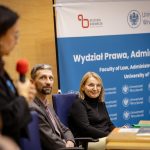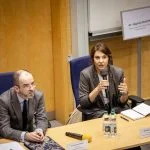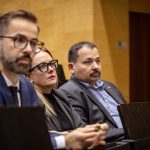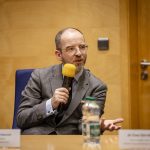
Academic Debate about Middle East (summary and audio recording)
On Tuesday, 30 October, a two-hour debate dedicated to the current situation in the Middle East took place in W. Świda’s hall at the Faculty of Law, Administration and Economics. The participants were University of Wrocław’s experts: dr Jagoda Budzik, dr Ewa Górska, dr hab. Barbara Kowalczyk, prof. Jarosław Jarząbek and dr Paweł Wróblewski. The conversation, which focused on the genesis and circumstances of the Israeli-Palestinian conflict, was moderated by prof. Patrycja Matusz, Vice-Rector for internationalisation.
In attendance were, among others: the initiator and official patron of the debate, the Rector of the University of Wrocław, prof. Robert Olkiewicz; the Vice-Rector for student affairs dr Łukasz Prus and his predecessor prof. Maciej Cesarz; dean of the Faculty of Law, Administration and Economics, prof. Jacek Przygodzki; students; lecturers; and guests from outside of UWr who were interested in the topic of the debate.
There were four rounds of the debate, during which the experts talked about: the situation in Israel and Gaza after 7 October 2023, the duties of international organizations and communities, migration policies regarding people from the Middle East, various forms of support for people harmed through military action, the autonomy of universities in Israel and Gaza, academic freedom and limited access to education, the matter of cooperation between academic institutions, as well as the role that international law and religion play in military conflicts. Questions and conversations with the audience, which included students currently occupying one of UWr’s buildings located at ul. Szewska (in defense of Free Palestine, among others), also formed part of the meeting.
Here are some fragments of the debate. Below the publication, a full audio recording of the debate can be found.
At the start of the debate, dr Jagoda Budzik defined “Zionism” as, on one side, a nationalistic movement born from a rapid surge of anti-Jewish violence which swept through Europe in the 19th century, and on the other, a movement which originated in a parallel manner to other European movements. Its end result was situating the country of Israel on the territory of Palestine.
Dr Ewa Górska talked about the displacement and hardships faced by Palestinian people on those territories: “Palestinians had to escape ethnic cleansing; those acts of ethnic cleansing are well documented, including by Israeli historians.”
Some of the information dr Górska drew attention to included the fact that Israel is till now using Ottoman regulations regarding land, which say that if the land’s ownership is passed to the government if the land is not cultivated by its owner for 10 years: “It is very easy to carry out in practice, since Israel impedes the owners’ access to their own land.”
Since the 1950s, Palestinians have become a nation demanding their own independence and the independence of their country.
When dr Paweł Wróblewski was asked about the role that religion plays in this war, he stated that politicians use religion instrumentally: “It is a policy that brutally uses the tool of religion, tries to transform and activate the worst stereotypes connected to religious beliefs, and exploits mutual fear. The genesis of that fear, may I say, is located in a lack of education, a lack of authentic attitudes and identities which finally point to the need of knowing the other side. The lack of discourse between the identities and the avoidance of certain communal initiatives lie at the ground of this war or this genocide.”
The discussion could not do without considering the role of the Holocaust in the creation of Israel.
Dr Jagoda Budzik pointed out that steps to establish a Jewish nation in Palestine started chronologically before the Holocaust. On the other hand, the extermination faced by Jews during World War II doubtlessly influenced the timing of establishing that nation and the form it took: “After WWII had ended, after the concentration camps had been freed, the people that survived were faced with an enormous dilemma: what’s next? Some of them wanted to remain in Europe. The first instinct of some Polish Jews was the want to return to their homes. However, the role of European societies is quite important in this matter and, for me, impossible to omit. The local European communities viewed the return of surviving Jews quite negatively. This led to some of those Jews not wanting to stay here, and it resulted in Europe having to deal with hundreds of thousands refugees. A place for them to live in had to be found.”
It can be concluded that Europeans feeling a sense of guilt over what happened to the Jews in World War II was also an important factor in the creation of settlements in Palestine.
Prof. Jarosław Jarząbek talked about the political area of the conflict. One of the most important matters here was the international position of contemporary Israel, as well as the inner conflicts in Israel itself.
The conclusion was that the country of Israel does not allow criticism. International law is also ineffective when it comes to military actions targeting civilian populations.
Palestine, on the other hand, is looking for allies on international stage. At the same time, how are Palestinians seen and why is Islam automatically associated with terrorism? “No one is talking about the fact that Palestinian Christians also exist, and that they are also under occupation,” pointed out dr Górska. “We don’t hear about the peaceful protests, about how in 2018 a Great March of Return took place in Gaza, in which thousands of Palestinians peacefully protested, which resulted in 23 000 of them being injured: they were mostly purposefully shot in the kneecaps, as that disables a person for a long time.
Prof. Jarząbek discussed Hamas: “The anger directed at Hamas is growing, since they are the ones directly responsible for the current situation of the Palestinians. Of course, all those things are done by Israel, but Hamas’s attack started it, and Palestinians are aware of that.”
The topics of boycotting Israeli universities and helping Palestinian academics were also discussed during the debate: “There are no buildings, no universities, they were all destroyed. But the academics are still there,” said dr Ewa Górska. “They conduct MA and BA thesis defenses, they organize lectures, online and in person, in tents, in other buildings. Local academics are constantly trying to be active and to keep their educational, scientific, didactic purpose alive. They ask for solidarity, for statements about the rebuilding of universities. Support for them includes help in giving lectures; for example, in English. It is also the offering of scholarships for remaining students who will participate in online classes if the technical conditions make that possible.”
On the other hand, how does one define an Israeli university? Are we talking about universities located on Israel’s territory, or also about the ones in West Bank? Should we differentiate between them? “We shouldn’t underestimate the fact that a lot of the studies which today’s criticism of Israel relies on was done by Israeli universities,” pointed out dr Górska.
The Rector of the University of Wrocław, Robert Olkiewicz, joined the discussion regarding support for Palestinian students. He said that UWr can offer a place at the University and material help to Palestinian youth:
“I have sent a letter to the Ambassador of Palestine in Poland, in which I offered additional help intended for Palestinian youth, including lowered tuition fees for studying courses taught in English, as well as possible accommodations (dormitory costs lowered up to 50%).”
The scholars who took part in the debate on 30 October 2024, led by prof. Patrycja Matusz, Vice-Rector for internationalisation:
Dr Jagoda Budzik, assistant professor at the Taube Department of Jewish Studies, UWr’s Faculty of Languages, Literatures and Cultures. As a researcher, she is interested in the topic of the Holocaust and its remembrance, Hebrew literature, and Israeli culture.
See more: https://uwr.edu.pl/nasi-mlodzi-naukowcy-z…/
Dr Ewa Górska, UWr’s Faculty of Law, Administration and Economics, Scientific Excellence Incubator – Digital Justice Center.
She specializes in legal sociology and empirical studies on law, but her research is connected to Islam and the Arab world. Her work includes studies on customary Arab law, critical geography of law based on the example of Palestine, bioethical matters in contemporary Muslim law, and orientalism and stereotypes in Polish law, particularly in case law. At the University of Wrocław she will manage the Sonata grant, where she will look at how Islam is presented in the case law of European courts, and also check how religion and secularism are understood under European law.
See more: https://uwr.edu.pl/kiedy-pasja-przeklada-sie-na-sukcesy/
Prof. Jarosław Jarząbek works at the UWr Institute of International and Security Studies. In his research, he focuses on security policies, political systems, and military powers of Middle Eastern countries, and the Israeli-Palestinian conflict. Recipient of the Fulbright Grant of the Polish-U.S. Fulbright Commission. Project coordinator for Erasmus Mundus Global Studies at the Institute of International and Security Studies.
See more (background of the conflict): https://uwr.edu.pl/konflikt-izraelsko-palestynski/
Dr hab. Barbara Kowalczyk works at the Comparative Public Administration Department, Institute of Administrative Sciences, UWr Faculty of Law, Administration and Economics. She serves as Vice-Dean for education. Her academic interests lie in immigration law, asylum law, comparative administration, and European administrative law. She is a legal counsel and a Consultant for the European Union Agency for Asylum (EUAA), formerly known as the European Asylum Support Office (EASO).
Dr Paweł Wróblewski works at the Institute of Philosophy, UWr Faculty of Social Sciences. He is a historian of ideas, a philosopher of religion, and an expert on inter-religious mediations and analyses of security in religious contexts (critical situations and conflicts). He has experience as an expert witness in court cases relating to religious beliefs.
Written by Katarzyna Górowicz-Maćkiewicz, Jacek Antczak
Photo coverage by Paweł Piotrowski
Translated by Monika Klimiuk (student of English Studies at the University of Wrocław) as part of the translation practice.





